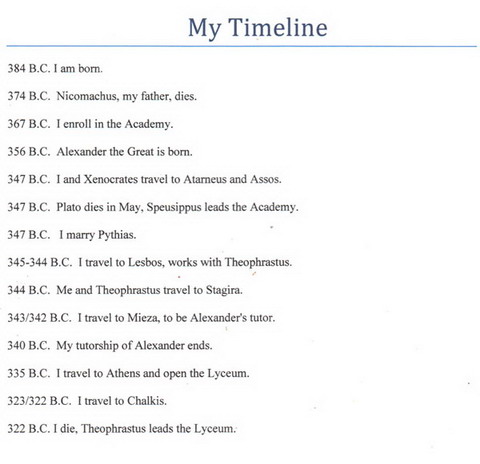“Aristotle, the Discoverer of Logic: First Person Perspective”
By: Madison B.
I am Aristotle, one of the greatest Greek philosophers. I was born in 384 B.C. in Macedonia, a country located north of Greece, but I spent most of my time in ancient Greece. My father served at the Macedonian court as physician to Amyntas II and I spent part of my youth there.
At the age of eighteen, I headed towards Athens and joined the Plato Academy to continue my education. I spent my next twenty years of my life in this academy. Three years later, I began tutoring Alexander the Great, who I influenced tremendously. I was also a big influence to Plato, Ayn Rand, James Joyce, and Thomas Aquinas. For the next twelve years of my life; I conducted courses at the school. I was famous for my books about metaphysics, poetry, theater, music, logic, rhetoric, linguistics, government, zoology, mathematics, physics, biology, botany, ethics, politics, agriculture, medicine, dance and theatre. I am the last man who had the knowledge of all the known fields.
Next, I decided to leave Athens. I arrived in Atarneus where I spent time in Assus. Then, I married Pythias, daughter of Hermias.
I was a towering figure in ancient Greek philosophy, making contributions to logic, metaphysics, mathematics, physics, biology, botany, ethics, politics, agriculture, medicine, dance and theatre. My works on logic are called the Organon, which is the instrument, because they investigate thought, which is the instrument of knowledge. The Organon includes The Categories, The Prior, and Posterior Analytics. I was the first philosopher to analyze the process where certain propositions can be logically inferred to be true from the fact that certain other propositions are true. I believed that this process of logical inference was based on a form of argument I called syllogism. In a syllogism, a proposition is argued or logically inferred to be true from the fact that other propositions are true. The Syllogism continued to play an important role in later philosophy.
There were many inventions from ancient Greece, but I am going to tell you about a few. The first is the umbrella. The umbrella was invented thousands of years ago. The umbrella’s name came from the Latin word umbra, which means shade. The first umbrellas were possibly inspired from the canopy of a tree, which would offer a cool shade from the heat of the day. The first umbrellas were made to shade people from the sun. Another name for an umbrella used as a sun shade is called a parasol. Umbrellas were used as much as 4,000 years ago in ancient Assyria, China, Egypt, and Greece. The Chinese were probably the first to waterproof the umbrella for use in the rain; they used wax and lacquer (a type of paint) to repel the rain. Samuel Fox (1815-1887), an English inventor and manufacturer, invented the steel ribbed umbrella in 1852 (wood or whale bone had been used before this).
My second invention from ancient Greece I choose to write about was the catapult. The catapult is a device that hurls heavy objects or arrows over a large distance. It was invented in ancient Greece in 399 B.C. by Dionysius the Elder of Syracuse. The Romans later added wheels to the catapult to make it more maneuverable.
The third invention from ancient Greece was the steam engine, which was invented by Heron, an Ancient Greek geometer and engineer from Alexandria. Heron made the steam engine as a toy and called his device the “aeolipile,” which means “wind ball” in Greek. The steam was supplied by a sealed pot filled with water and placed over a fire. Two tubes came up from the pot, letting the steam flow into a spherical ball of metal. The metallic sphere had two curved outlet tubes, which vented steam. As the steam went through the series of tubes, the metal sphere rotated. The Greeks never used this remarkable device for anything but a novelty. A steam engine designed for real work wasn’t designed until 1690.
My favorite quote was “The ultimate value of life depends upon awareness and the power of contemplation rather than upon mere survival.” In conclusion, I was one of the greatest philosophers who ever lived. One of my favorite outcomes of my inventions was the logic grid.





“Aristotle.” www.iep.utm.edu/atistotle. Date retrieved February 2, 2013.
“Aristotle.” World Book Encyclopedia. Volume 1, 2011. pp 663-664.
“Aristotle.” www.narodnopozoriste.rs. Date retrieved February 18, 2013.
“Aristotle.” www.infoplease.com. Date retrieved February 18, 2013.
“Aristotle.” www.stenudd.com/aristotle/aristotle-life-10-timeline.htm. Date retrieved February 18, 2013.
“Inventors and Inventions.” www.enchantedlearning.com/inventors/greece.html. Retrieved on February 20, 2013. |
